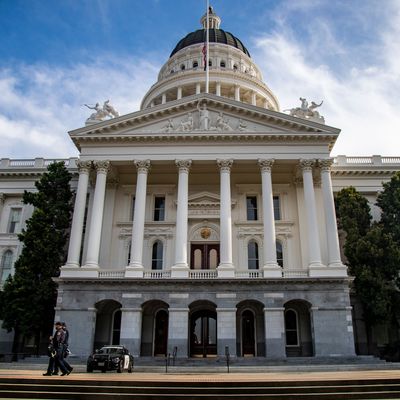
The relatively disappointing legislative results of the Democrats’ trifecta in Washington is attributable in no small part to the great obstructive power of the Senate filibuster in a chamber split 50-50 between the two parties. But sometimes a lack of partisan power can’t explain progressive policy failures. Few states are more reliably Democratic than California. Democrats hold solid vetoproof supermajorities in both Houses of the California legislature, and the latest decennial redistricting process (conducted by an independent commission) shouldn’t change that any time soon. And vetoes are rarely necessary, since the governor has been a Democrat since Arnold Schwarzenegger left office in 2011. Any thought that a post-2020 backlash against Democratic rule might upset the Golden State party status quo died with the decisive September 2021 defeat of a ballot initiative aimed at removing Governor Gavin Newsom from office.
Yet California lawmakers have chronically failed to fulfill pledges to achieve the most cherished policy goal of the state’s progressive activists: creating a state-financed universal health-care system. It’s happened again this year with the demise of a single-payer bill without so much as a vote in the lower chamber of the legislature, the California Assembly.
Single-payer health care is part of the California Democratic State Platform, and the state party’s Progressive Caucus has threatened to withhold endorsements from legislators who didn’t support it. It was backed by Newsom when he was elected in 2018, and by Assembly Speaker Anthony Rendon this year. Like the measure that passed the California Senate in 2017 but died in the Assembly, the current bill, AB 1400, is all dessert and no green beans: it prospectively bans private health insurance and sets up a public single-payer system but puts off enactment the tax revenues (somewhere between $314 billion and $390 billion annually, according to legislative analysts) to pay for the new benefits.
Yet AB 1400’s principal sponsor, San Jose legislator Ash Kalra, yanked the bill earlier this week, arguing that he was far short of the votes needed to enact it and didn’t want to put his colleagues on the spot with a recorded vote.
Newsom didn’t comment on the situation. Rendon pushed the blame onto Kalra. Progressives organizations — most notably the California Nurses Association, which has made enactment of single-payer health care its major priority — were very unhappy with the outcome, the latest in a number of major disappointments on this subject in California and elsewhere. The CNA blasted Kalra by name in a statement, saying, “Nurses are especially outraged that Kalra chose to just give up on patients across the state.”
So why does this keep happening? Progressives who consider single-payer a no-brainer substantively point to the enormous corporate lobbying apparatus opposing this or similar universal-health-care legislation, as CalMatters notes:
The influential California Chamber of Commerce, which represents business interests in the state, labeled AB 1400 a “job killer” shortly after it was reintroduced in January, indicating it would be a top priority to defeat. Its lobbying campaign — joined by dozens of insurers, industry groups and the associations representing doctors and hospitals — included social media advertisements and a letter to members denouncing the “crippling tax increases” that would be needed to pay for the system.
But it’s this last issue — taxes — that probably best explains the reluctance of Democratic legislators to put their money where their mouths are on single-payer. Some argue passing a bill like AB 1400 without including the taxes necessary to implement it is simply irresponsible. Others fear a tax revolt that could revive the moribund California Republican Party. That is particularly true on the brink of a midterm election in which the GOP may have the wind at its back across the nation, possibly extending all the way to the West Coast.
In any event, Democratic legislators who did not publicly express support for the legislation will brace themselves for possible primary challenges, while Newsom, who is up for reelection next year, will need to make clearer what he will and won’t support and how hard he’ll fight for health-care reform when it comes back up, as it most definitely will. While remaining mostly silent about AB 1400, Newsom has given a lot of attention to his own proposals to expand the state’s Medicaid program to include undocumented immigrants and others excluded from the current health-care system.
The whole brouhaha helps explain why single-payer health care is not seriously being discussed in Washington, and why progressives with a clear and fixed vision of the kind of society Democrats ought to support are so often disappointed.






























